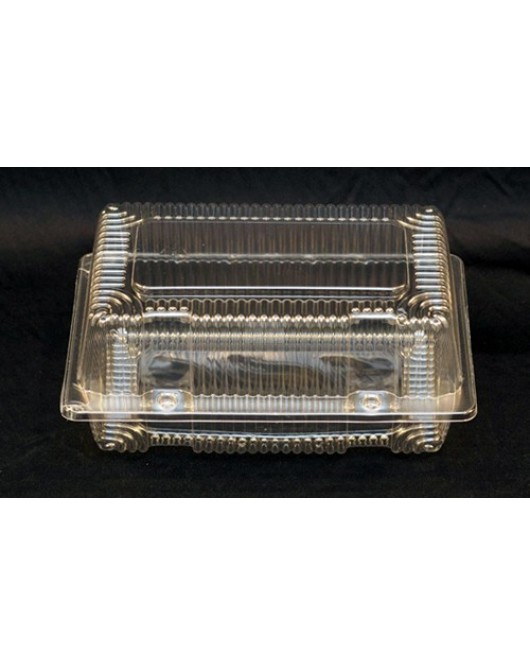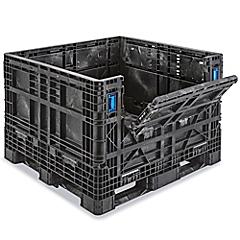Discover where to find high-quality bulk plastic containers for sale
A Comprehensive Overview to the Various Sorts Of Mass Plastic Containers Available Today
Mass plastic containers play a crucial role in various markets, offering services for storage space and transport. Their diverse types satisfy various requirements, from rigid alternatives for strong products to versatile containers fitting various shapes. Each kind presents distinctive advantages, making it necessary to recognize their functions and applications. As sectors develop, so do the demands for efficient container remedies. What factors should one take into consideration when choosing the best bulk container?
Overview of Mass Plastic Containers

Kinds Of Bulk Plastic Containers
Mass plastic containers been available in numerous kinds, each suited to particular applications. Rigid mass containers, versatile mass containers, and intermediate mass containers represent the primary classifications, each offering unique benefits. Recognizing these kinds is necessary for picking the appropriate container for transporting and saving materials.

Rigid Bulk Containers
Rigid bulk containers are important for efficient storage and transport of different materials across industries. These containers are usually built from sturdy plastics, permitting them to stand up to severe handling and ecological conditions. They can be found in various forms and sizes, consisting of totes, drums, and containers, making them ideal for saving everything from granular substances to fluids. Inflexible containers often include reinforced wall surfaces and protected covers, making certain the materials stay protected during transportation. Their stackable layout takes full advantage of storage room, making them perfect for storage facilities and manufacturing centers. Additionally, several inflexible bulk containers are recyclable and reusable, adding to sustainability initiatives. In general, their toughness and flexibility make inflexible bulk containers an essential component in supply chain procedures.
Flexible Mass Containers
Versatile bulk containers, commonly referred to as adaptable intermediate mass containers (FIBCs), work as a functional option for keeping a selection and delivering of dry products. These containers are normally made from woven polypropylene and are made to be lightweight yet strong, permitting effective handling and stacking. Their adaptability enables them to suit different forms and dimensions, making them appropriate for items ranging from grains to chemicals. FIBCs can be equipped with functions such as spouts for very easy filling and discharge, along with safety finishings for enhanced sturdiness. In addition, they are reusable and recyclable, contributing to sustainable methods in sectors like agriculture, food processing, and building. Generally, versatile mass containers supply a effective and cost-effective choice for mass product monitoring.
Intermediate Bulk Containers
Intermediate bulk containers (IBCs) are vital for the reliable transportation and storage space of fluids and granular materials across different industries. These containers usually have a capacity varying from 275 to 330 gallons and are created for easy managing and piling. Made from durable products like high-density polyethylene or steel, IBCs provide excellent defense versus contamination and ecological variables. Their design includes attributes such as a built-in pallet for forklift gain access to and a detachable top for easy dental filling and cleansing. IBCs are commonly used in chemical, food, and pharmaceutical markets, guaranteeing compliance with security policies. Their versatility and reusability make them an economical solution for mass storage space and transportation, adding to provide chain effectiveness and sustainability.
Attributes and Benefits of Bulk Plastic Containers
Bulk plastic containers are crucial tools in numerous industries, providing a mix of durability and practicality. These containers are built from premium materials, making them resistant to influences, chemicals, and environmental variables. This effectiveness warranties item safety and security throughout storage and transport.
Additionally, bulk plastic containers are light-weight, promoting simplicity of decreasing and managing delivery expenses. Their stackable design takes full advantage of storage efficiency, permitting optimized warehouse space. Numerous designs feature safe lids or closures, providing a closed seal that stops and maintains components contamination.
Bulk plastic containers are recyclable and frequently recyclable, adding to lasting techniques. Their versatility enables a variety of applications, from food storage space to commercial use, enhancing their worth across sectors. Organizations profit from the lengthy life-span and reduced upkeep demands of these containers, making them an affordable remedy for both long-lasting and temporary demands.
Industries That Make Use Of Bulk Plastic Containers
Different markets take advantage of using mass plastic containers, each leveraging their unique buildings for particular applications. The food and beverage sector relies upon these containers for safe storage space and transport of products, while the chemical production industry uses them for taking care of hazardous products. Furthermore, the pharmaceutical circulation needs stress the value of toughness and cleanliness in product packaging services.
Food and Drink Market
As the need for efficient and risk-free storage space solutions continues to climb, the food and beverage market increasingly counts on mass plastic containers for their operational requirements. These containers give robust, lightweight, and flexible choices for saving components, completed items, and waste products. Made from food-grade products, they ensure conformity with health and wellness criteria. Various layouts, such as stackable bins and carry boxes, optimize area during transportation and storage, boosting logistical performance. Furthermore, the openness of some bulk containers permits very easy inventory administration, lowering the threat of putridity. With the market's concentrate on sustainability, numerous makers are now using recyclable and reusable choices, straightening with green techniques while satisfying the high needs of food safety and security and health.
Chemical Manufacturing Field
The chemical production field depends heavily on bulk plastic containers for the safe and reliable storage space of raw materials, intermediates, and ended up products. These containers are developed to hold up against various chemicals, guaranteeing that dangerous materials do not leak or weaken the container itself. Usual types consist of high-density polyethylene (HDPE) and polypropylene containers, which offer excellent chemical resistance and resilience. Their light-weight nature and stackable style promote transport and storage space, maximizing area in making facilities. In addition, several bulk plastic containers feature features such as tamper-evident seals and easy-to-read labeling, improving safety and conformity with industry guidelines. Generally, bulk plastic containers are essential to the chemical manufacturing procedure, providing reputable options for handling varied compounds.
Drug Circulation Demands
Pharmaceutical best site circulation counts on bulk plastic containers to meet rigid security and regulative requirements. These containers are important for saving a range and transferring of pharmaceutical items, consisting of active pharmaceutical components (APIs) and finished medicines. Their layout guarantees security versus contamination, wetness, and light, preserving the integrity of sensitive products. Furthermore, bulk plastic containers are compliant with industry criteria such as Good Manufacturing Practices (GMP) and are frequently made from materials that are FDA-approved. The use of these containers enhances performance in the supply chain, permitting risk-free, large circulation while decreasing waste. Firms in the pharmaceutical sector prioritize using sturdy, leak-proof, and tamper-evident containers to assure product safety and security and top quality throughout the logistics process.
Considerations for Picking the Right Container
When selecting the proper mass plastic container, different elements need to be meticulously evaluated to assure suitable performance and security. The nature of the materials to be saved is critical; compatibility with the container's material can influence stability and security. plastic bulk containers. In addition, the container's dimension and shape must align with the storage space and transport requirements, guaranteeing reliable room usage
Load ability is another vital consideration, as it ought to fit the weight of materials without threat of damage or failing. The layout functions, such as venting or covers, can visite site affect functionality and access. Compliance with market policies is vital, particularly in fields like pharmaceuticals, where safety standards are rigorous.
Finally, the anticipated life-span and toughness of the container should be evaluated to confirm it meets the functional requirements without regular substitute. By assessing these variables, one can select one of the most suitable mass plastic container for certain applications.
Ecological Effect and Sustainability
As businesses progressively focus on sustainability, the environmental effect of bulk plastic containers has actually come under analysis. These containers, frequently made from materials such as polyethylene or polypropylene, contribute considerably to plastic waste otherwise managed effectively. Their production includes the consumption of nonrenewable fuel sources, which can result in enhanced greenhouse gas discharges. Nonetheless, developments in recycling technology and the development of eco-friendly choices are assisting to reduce these worries.
Many makers are taking on practices that emphasize the use of recycled materials, consequently decreasing the need for virgin plastics. The look these up resilience of mass plastic containers additionally plays a function; they are created to be recycled multiple times, which can minimize their total environmental impact when compared to single-use alternatives. Inevitably, the industry encounters the challenge of balancing functionality with ecological obligation, making sustainable methods crucial for the future of bulk plastic containers.
Best Practices for Storage and Transportation
Effective storage space and transportation of bulk plastic containers significantly affect both functional efficiency and sustainability. To optimize area, companies need to pile containers securely, guaranteeing stability and preventing damage. Correct labeling is crucial for simple identification, which improves access processes. Furthermore, keeping a orderly and tidy storage space area decreases the danger of contamination and boosts security.
For transportation, picking the right car is essential; containers should be protected to prevent shifting throughout transit. Companies ought to also consider utilizing pallets to facilitate simpler loading and discharging. Normal inspections of containers for wear and tear can prevent expensive substitutes.
Temperature level control is one more vital element, as severe problems can endanger the honesty of the plastic. Ultimately, training employees on best practices for managing and transport warranties compliance and advertises a culture of safety and security. By implementing these best methods, services can improve their functional performance while adding to ecological sustainability.
Regularly Asked Inquiries
Exactly how Do I Tidy Mass Plastic Containers Properly?
To clean bulk plastic containers properly, one should wash them with cozy water, use a mild detergent and scrub with a soft brush. Wash thoroughly, after that permit to air dry completely before storage space or reuse.
What Is the Lifespan of Mass Plastic Containers?
The life expectancy of bulk plastic containers typically varies from 5 to one decade, relying on the product, use, and environmental problems. Appropriate upkeep and storage can considerably expand their use and toughness in time.
Can Mass Plastic Containers Be Customized?

Do Mass Plastic Containers Have Guarantee Options?

Exist Laws for Utilizing Mass Plastic Containers?
Yes, regulations exist for using bulk plastic containers, mainly concentrated on security, environmental effect, and material compliance. These guidelines assure that containers satisfy sector requirements and appropriate for transferring different materials securely and successfully.
Inflexible bulk containers, flexible mass containers, and intermediate mass containers stand for the primary groups, each offering distinct benefits. Versatile mass containers, frequently referred to as flexible intermediate mass containers (FIBCs), serve as a flexible service for transferring and storing a selection of completely dry products. The chemical manufacturing field relies heavily on mass plastic containers for the reliable and risk-free storage of raw products, intermediates, and ended up products. plastic bulk containers. These containers are designed to endure various chemicals, making certain that dangerous materials do not leakage or break down the container itself. Furthermore, bulk plastic containers are compliant with industry standards such as Great Manufacturing Practices (GMP) and are commonly made from products that are FDA-approved